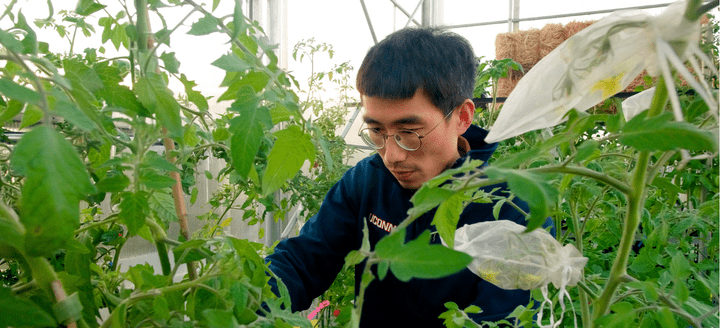
Agriculture is responsible for ensuring a safe and abundant food supply. For consumers, that means the products they see at the grocery store or farm market. Climate change, loss of land, and competition for natural resources all present challenges for growing food.
Researchers in UConn’s College of Agriculture, Health and Natural Resources are exploring options to help ensure consumers have a safe, abundant and nutritious food supply. The project, which is studying a genetic editing technique in tomato plants, is funded by USDA’s National Institute of Food and Agriculture as part of the Biotechnology Risk Assessment Research Grant (BRAG) program.
The BRAG program supports the generation of new information that will assist federal regulatory agencies in making science-based decisions about the effects of introducing genetically engineered organisms (GE) into the environment.
“Our project is studying the unintended effects of CRISPR/dCas-mediated editing of DNA methylation, using tomato as a model crop plant,” said Yi Li, the principal investigator of a project and a UConn professor in the Department of Plant Science and Landscape Architecture.
Genetically engineered organisms are becoming increasingly popular given their potential applications to improve the food supply. Gene editing allows scientists to manipulate an organism’s DNA, leading to produce that stays fresher longer, resists pests and viruses or results in higher nutritional content.
One common method of gene editing is manipulating DNA methylation, a naturally occurring biological process that influences many growth and developmental events of crop plants, including fruit quality. Targeted manipulation of DNA methylation may make food crop plants more resilient to environmental stresses and more nutritious.
“In our experiment, we use a CRISPR/dCas system to edit DNA methylation at a specific gene location and hope that can lead to production of more nutritious and tasty tomato fruits,” said LI. “At the same time, we are also studying any unintended and undesirable effects resulting from off-target DNA methylation.”
This promising gene editing technique could improve crops on a large scale. However, the potential unintended side effects of this process are not yet well-studied, so additional research is needed prior to introducing the technique for potential commercial agricultural applications.
Tomatoes are one of the most popular forms of produce, making them an excellent candidate for potential gene editing enhancements. Furthermore, tomato quality and attributes are highly influenced by DNA methylation events.
“We are producing and characterizing DNA methylation-edited tomato plants at this time,” said Hengsong Li, a doctoral student in the Department of Plant Science and Landscape Architecture, working on the project. At this specific stage of the project, one of the experiments that Hengsong does is analyzing his plants for changes in DNA methylation levels in the targeted genes.
Results of this project should reveal if there are unintended effects of CRISPR/Cas-mediated DNA methylation, and aid plant breeders who are practicing DNA methylation editing in crops. The project results should also facilitate policy-and decision-making process at federal regulatory agencies.
“Meanwhile, we are incorporating the science-based knowledge generated from this project into public education efforts to improve society’s understanding about gene editing technology,” says Stacey Stearns, a communications specialist with UConn Extension and co-principal investigator on the project.
Top Photo: Hengsong Li, a doctoral student in the Department of Plant Science and Landscape Architecture, analyzes his plants for changes in DNA methylation levels in the targeted genes.
Financial support for this work was provided by the USDA NIFA Biotechnology Risk Assessment Research Grants Program Award 2021-33522-35343.